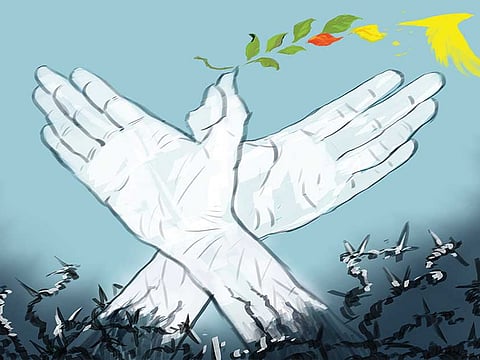Myanmar’s democratic challenge
Opposition leader Aung San Suu Kyi faces criticism about her silence on the horrific plight of the Rohingya. Even friends outside the country say she should have spoken more about the issue

Aung San Suu Kyi, Nobel peace laureate and chair of the opposition National League for Democracy (NLD) party in Myanmar, spoke last week over the telephone about her recent trip to China, elections scheduled in her country for November and other matters. A fuller transcript is available online at washingtonpost.com/opinions. An edited transcript follows:
QUESTION: What did you learn on your trip to China?
AUNG SAN SUU KYI: It was a good discussion. We all understand that neighbours have to live in peace and harmony.
Did you discuss the imprisonment of [fellow Nobel peace laureate] Liu Xiaobo?
I have to keep explaining that I never discuss details of my conversation with leaders of governments or organizations. These are usually considered private.
During your imprisonment, the Chinese weren’t supportive of you, and you welcomed when foreign leaders raised the issue of your imprisonment.
Freedom and democracy in each country will be something that their own people will work for. With regard to our relationship with China, it’s always been based on independence, and I believe we can maintain this relationship, even if we don’t agree on the ideologies we wish to practice within our respective countries.
So “freedom and democracy in each country will be something that their own people will work for” - is that the attitude the US should take toward Myanmar?
I think all people work for what they want for their own country, and of course they do expect their friends to help if they can.
Well, let me ask about your own country ...
Yes, please do. I think I prefer talking about my own country.
How likely are elections in the fall to produce a government that’s representative of the people?
Well, we’ve entered a very exciting period. For the first time we’ve started discussing draft amendments to the constitution in the legislature. How free and fair the elections will be will be linked to whether the constitution has been amended to provide a level playing field.
In general, how do you view the state of political reform?
What we had hoped for is that the government would enter into genuine negotiations to make sure that the democratisation process is a real one. But it has become increasingly obvious that the government is not really very interested in negotiation. . . .
But on the other hand we really hadn’t expected it to be smooth running all the way.
Why the rise of Buddhist nationalism?
I think we have to make a distinction between nationalism and extremism, and what we worry about is extremism. Nationalism, when it’s controlled and when it’s used in the right way, that is not a bad thing. It’s extremism that is a problem.
Do you think the Rohingya should have citizenship?
The government is now verifying the citizenship status under the 1982 citizenship law. I think they should go about it very quickly and very transparently and then decide what the next steps in the process should be.
Has there been a retrenchment of basic freedoms since the early liberalisation?
Well, it was more than a year ago that we began to notice that the government was beginning to crack down on freedom of the media. You must have heard about it, how some journalists were arrested and sentenced to somewhat longish terms in prison. And we felt then that the reform process was not only stalled but perhaps going backwards.
Are reforms still going backward?
I don’t think anything is going to happen ahead of the elections, apart from the constitutional issue, and in my opinion the government is totally opposed to constitutional amendment. That’s regression enough, don’t you think?
How does it feel to be turning 70?
Well, I don’t feel very different, but it’s interesting that I’ve made it this far.
— Washington Post



